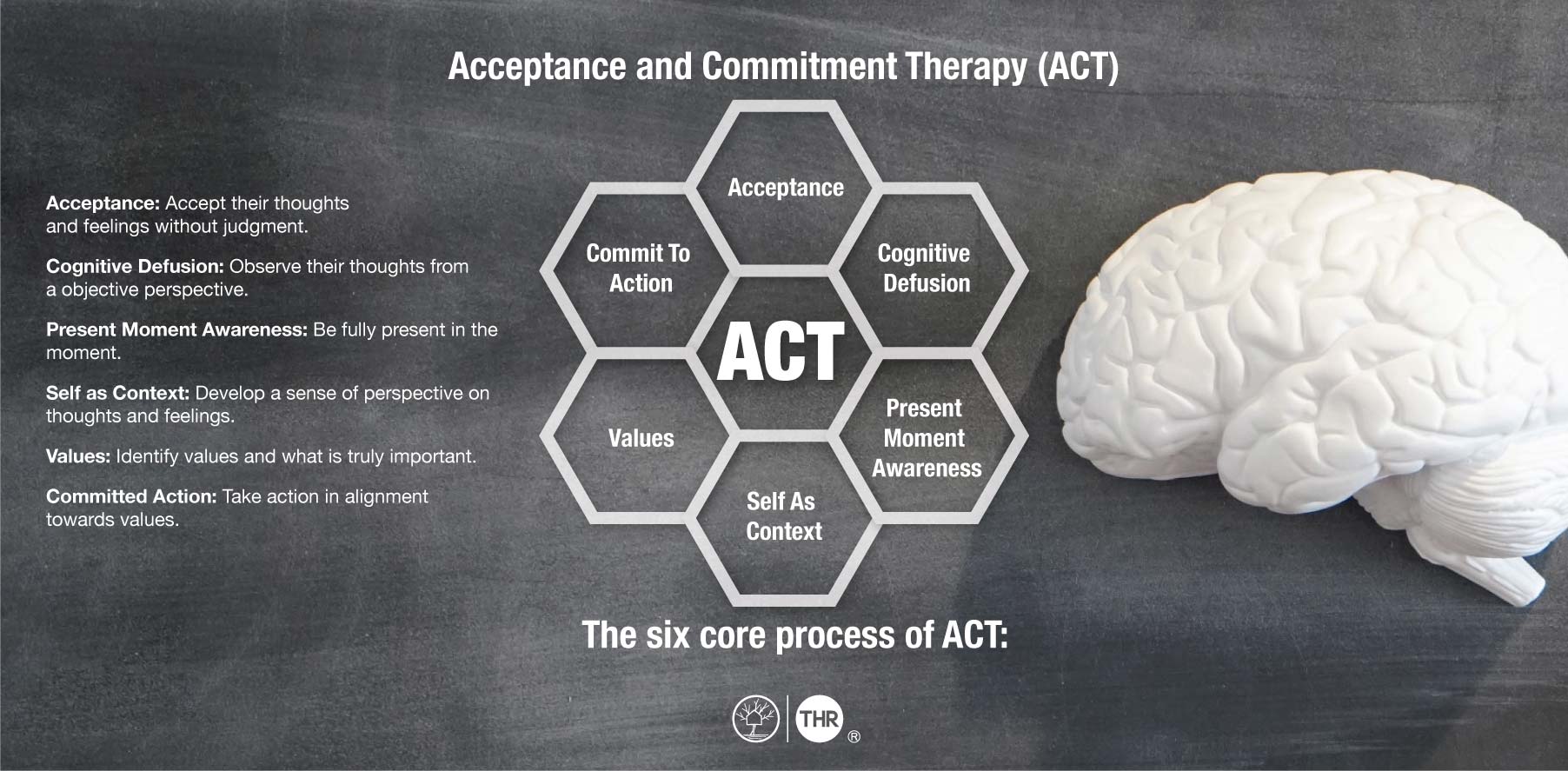Acceptance and Commitment Therapy (ACT)
Acceptance and Commitment Therapy (ACT)
What Is ACT Therapy for Addiction Treatment?
Acceptance and Commitment Therapy (ACT) is a research-backed approach to psychotherapy that empowers individuals to navigate emotional and psychological challenges, including substance use struggles, by fostering mindfulness, resilience, and meaningful action.
Our experienced therapists use ACT to help clients develop greater psychological flexibility, cope with complex thoughts and feelings, and live more fulfilling lives for sustainable sobriety. ACT is one of the evidence-based modalities we use in our holistic addiction recovery approach at Tree House Recovery.

What Is Acceptance and Commitment Therapy (ACT)?
Acceptance and commitment therapy (ACT) is a type of psychotherapy designed to help you move forward from negative thoughts and feelings by:1
- Accepting your emotions
- Being present
- Creating values
- Detaching from negativity
- Seeing yourself completely
- Reaching set goals
It’s natural to experience negative thoughts and emotions, but how you respond to them matters. ACT helps change how you engage with thoughts and feelings, allowing you to process them healthily, build coping skills, and move forward on your journey of personal growth and self-discovery.
ACT therapists can help you pay attention to this unhealthy habit and focus on healthy actions to move in a direction that benefits long-term sobriety.
What Does ACT Treat?
ACT is a form of cognitive-behavioral therapy (CBT) that targets attention and acceptance using behavioral therapy, mindfulness, and Eastern philosophy research and principles.
Unlike CBT, ACT emphasizes acceptance, mindfulness techniques, and cognitive and behavioral interventions that help create strong relapse prevention skills.
Who Is ACT Therapy For?
ACT is excellent for individuals who have been struggling with intrusive or distressing thoughts. Anyone looking to manage the following may find benefits from ACT:
- Addiction
- Alcohol use disorder
- Anxiety disorders
- Depression
- Post-traumatic stress disorder (PTSD)
- Social anxiety disorder
- Stress
- Substance use disorder
Anyone can benefit from acceptance and commitment therapy, but young adults and adults benefit the most from ACT. Because this type of therapy requires abstract thinking (understanding things, ideas, or concepts that are not physical), ACT can be challenging for children.
What to Expect from ACT Therapy
The Benefits of ACT Therapy
ACT is effective for a wide range of mental health issues, including anxiety, depression, and addiction. By helping clients develop greater psychological flexibility, ACT can help them reduce the impact of complex thoughts and feelings on their lives and find greater meaning and purpose.
We believe that purpose and meaning are critical components of attaining lasting sobriety, and ACT helps you find them.
Some specific benefits of ACT include:
- Greater emotional regulation: Individuals can better regulate their emotions and manage difficult feelings.
- Improved relationships: Clients can develop more meaningful and authentic relationships with others.
- Increased self-awareness: People can better understand their thoughts, feelings, and behaviors.
- Increased self-compassion: Through ACT, individuals can develop greater self-compassion and acceptance, boosting self-esteem and self-worth.
- Improved overall well-being: ACT can improve overall well-being and quality of life by helping individuals develop greater psychological flexibility.
How Long Is ACT Therapy?
ACT can likely continue throughout a person’s time in an addiction treatment program if the ACT therapists have determined that it will benefit you.
Therapy services like ACT don’t work overnight. It is important to remember that you will get out of these services what you put into them.
Hard work and dedication to your practice will show the effectiveness of ACT.
How Does ACT Therapy Work?
During your session with ACT therapists, you’ll learn more about yourself and your personal goals with this form of therapy. Your therapist will give you more information on what to expect from the session and help plan milestones and daily practices.
The first session may feel overwhelming, but trying something new that requires any change always does. It is important to remember that you are taking a positive step forward by showing up for each session.
ACT is a journey of self-discovery, helping you connect with your core values and build a life that aligns with them. Every session is unique, but you can expect to engage in exercises and techniques designed to help you:
- Acknowledge and adjust behaviors, thoughts, and feelings
- Create and accomplish meaningful goals tailored to you
- Cultivate mindfulness and present-moment awareness
- Identify and embrace your core values
The Six Core Processes of ACT
Each exercise will integrate the six fundamental processes of ACT, guiding you toward psychological flexibility and growth:2
- Acceptance: Embrace thoughts and feelings without judgment.
- Cognitive defusion: Observe thoughts objectively without getting caught up in them.
- Present moment awareness: Stay focused on the here and now, not past regrets or future worries.
- Self as context: View thoughts and feelings as transient, not defining who you are.
- Values: Identify core values to guide decisions and actions.
- Committed action: Take action aligned with values, even when facing challenges.
Each of these processes works together to help clients achieve greater psychological flexibility and overcome the barriers to living the lives they want to live.
Mastering these processes takes time and practice. With help from your ACT therapist, you’ll be able to learn, adjust, and keep practicing until these processes become second nature.
How Does ACT Help With Addiction Treatment?
Because addiction can influence feelings of depression, anxiety, and a negative self-stigma, ACT can help those experiencing addiction identify those feelings, the context of their feelings, and how to take healthy actions to reduce them.
The ability to address and take action against negative feelings is known as psychological flexibility. This relapse skill allows people to fully acknowledge and accept their thoughts without judgment and adapt to change their feelings, thoughts, or situations.
The Substance Abuse and Mental Health Services Administration (SAMHSA) endorses ACT as an evidence-based program and practice.3 This service can be used alone or in conjunction with other types of substance abuse therapies.
Some benefits of using ACT for substance use disorders include 4, 5:
- Enhance tolerance for cravings
- Improve acceptance of thoughts, feelings, and sensations
- Build a substance-free, fulfilling life
- Address co-occurring disorder symptoms
- Foster psychological flexibility for better choices
- Increase the chances of sustained abstinence
- Focus on long-term recovery goals aligned with values
Because of ACT’s success in addiction treatment5, Tree House Recovery proudly offers this service in our treatment program.
Summary: Acceptance and commitment therapy (ACT) helps individuals develop psychological flexibility, enabling them to manage cravings, process trauma, and align actions with personal values. This outcome-based approach complements Tree House Recovery’s comprehensive goal of lasting sobriety.
FAQs About Acceptance and Commitment Therapy (ACT)
Acceptance and commitment therapy (ACT) is an evidence-based psychotherapy that helps individuals accept complex thoughts and feelings rather than avoid them. It teaches people how to commit to healthy actions guided by their values.
ACT helps individuals break free from the cycle of avoidance that often drives addiction. It builds psychological flexibility, allowing people to face cravings, trauma, and emotional pain without returning to substance use.
Yes, ACT is different from CBT. While CBT focuses on changing negative thoughts, ACT emphasizes accepting them without judgment and taking action. Both are effective, and Tree House Recovery integrates elements of both therapies into personalized treatment plans.
ACT is beneficial for individuals struggling with co-occurring mental health conditions like anxiety, trauma, or depression. It’s ideal for those who want to improve emotional resilience and stay grounded in long-term recovery.
Yes, Tree House Recovery in Colorado includes ACT in our holistic treatment model. We combine ACT with physical fitness, group therapy, and trauma-informed care to support lasting recovery from addiction.
Find an ACT Therapist in Colorado – Get Started Today
At Tree House Recovery, we designed our ACT program to equip individuals in recovery with the tools and skills they need to overcome addiction. With a holistic, evidence-based approach, we use ACT and other therapies to rebuild a person’s physical and emotional strength.
Contact our admissions team in Colorado to learn more about ACT and other addiction treatment services we offer to help you thrive again.
Sources
- Dindo, L., Van Liew, J. R., & Arch, J. J. (2017). Acceptance and Commitment Therapy: A Transdiagnostic Behavioral Intervention for Mental Health and Medical Conditions. Neurotherapeutics : the journal of the American Society for Experimental NeuroTherapeutics, 14(3), 546–553. https://doi.org/10.1007/s13311-017-0521-3
- The six core processes of ACT. The Six Core Processes of ACT | Association for Contextual Behavioral Science. (n.d.). https://contextualscience.org/the_six_core_processes_of_act
- Wilson, K. G., Schnetzer, L. W., Flynn, M. K., & Kurz, A. S. (n.d.). Acceptance and Commitment Therapy for Addiction. https://solomonkurz.netlify.app/pdf/Wilson, Schnetzer, Flynn & Kurz (2012 Chapter) ACT for addiction.pdf
- Osaji, J., Ojimba, C., & Ahmed, S. (2020). The Use of Acceptance and Commitment Therapy in Substance Use Disorders: A Review of Literature. Journal of clinical medicine research, 12(10), 629–633. https://doi.org/10.14740/jocmr4311
- Lee, E. B., An, W., Levin, M. E., & Twohig, M. P. (2015). An initial meta-analysis of Acceptance and Commitment Therapy for treating substance use disorders. Drug and alcohol dependence, 155, 1–7. https://doi.org/10.1016/j.drugalcdep.2015.08.004
It's Lifestyle Recovery
There is a Better Way to Overcome Addiction – A Health-Centered Program.
- MIND
- BODY
- SOCIAL

Author
Robert Funk: Addiction Writer
